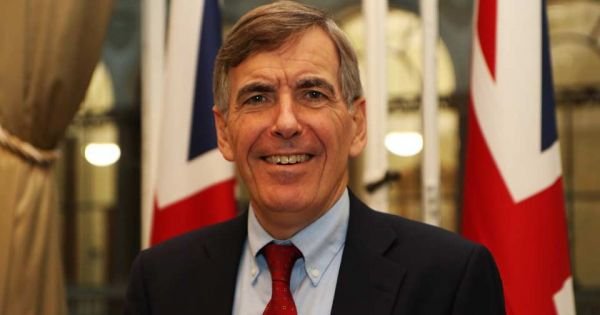UK reply to Argentina at OAS, “no dialogue on sovereignty unless the Falkland Islanders wish it”
[ad_1]
UK reply to Argentina at OAS, “no dialogue on sovereignty unless the Falkland Islanders wish it”
The Foreign Office minister also questioned that the Argentine government does not want to discuss anything on the South Atlantic in good faith.
British Foreign Minister for the Americas and the Caribbean, David Rutley MP gave a statement, on 23 June, to the Organization of America States in response to the Argentine Government’s draft declaration on the Falkland Islands:
Secretary General, Assistant Secretary General, Ministers, Delegates – friends and colleagues. It is an honor to represent the United Kingdom here as a permanent observer state.
Ten years ago, their government asked the people of the Falkland Islands whether they wished to retain their links to the UK as a self-governing Overseas Territory. In a referendum with a 92% turnout, 99.8% of those who voted chose to retain the Island’s links to the UK.
An observer mission from six countries, including OAS states Brazil, Chile, Paraguay, Uruguay, Canada and the USA oversaw this referendum, and their ringing endorsement of the process was that it was “free and fair”.
The people of the Falkland Islands have made their wishes clear – they do not wish to be incorporated against their will into Argentina. Likewise, they make it very clear to me that the UK has no mandate to negotiate with Argentina on the future of their home.
I am not here to talk about events in the 19th century – who claimed what rock first. What we are talking about is the democratic rights of the community who live on the Islands, and their right to decide their own future. They have no other home and, despite the challenges of living on these remote islands, they are proud of their community and what they have achieved.
Today the Islanders are economically self-sufficient, run a sustainable fishery, and have one of the highest per capita incomes in the world. They are probably the smallest jurisdiction to have an A-plus credit rating- an endorsement of their stable and democratic government.
Before adopting this motion today, you should all be clear what you are endorsing. Argentina officially argues that the right to self-determination does not apply to the people of the Falkland Islands – so putting it bluntly, they argue the Islanders are not entitled to democracy.
This motion calls for two larger countries to negotiate, without the consent of those who live there, over the transfer of the Islands to Argentina. The United Kingdom will not negotiate to transfer the sovereignty of the Islands as the local population have clearly shown they do not want this.
The Falkland Islands are internally self-governing, and the Islanders fiercely guard their constitution and the powers of their elected government. They have their own constitution, laws, currency and traditions.
It is absurd to argue that this community, which stretches back 10 generations on the Islands, is not a real community and does not deserve the democratic rights we expect for ourselves.
Their elected representatives make decisions that affect the lives of the people on the Falkland Islands – they want to focus on issues that matter to their community, better education, healthcare, environmental conservation, and they are doing very well in all of these areas.
It is sometimes asserted that the United Kingdom is ‘militarizing’ the South Atlantic, but the forces on the Islands are entirely defensive. The United Kingdom’s military presence has significantly reduced since 1982 and are at the minimum necessary to defend the Islands. Any suggestion that we are seeking to militarize the wider region is entirely without foundation and is not based on fact.
The UK wants and continues to seek a positive and constructive relationship with Argentina in the best interests of both our countries and of the wider region. It is to be regretted that Argentina has chosen this year to further undermine its relationship with the UK, both on South Atlantic issues but also, as a consequence, on wider bilateral matters of interest.
March 2023 saw Argentina unilaterally withdraw from the 2016 Joint Communiqué. This landmark undertaking offered great benefits to the people of the Falkland Islands, the United Kingdom and Argentina. These included a commercial flight to the Falkland Islands from Brazil that stopped in Argentina – the second commercial flight to the Islands from the South American mainland, fisheries cooperation, and the establishment of a framework for humanitarian work to take place.
The Falkland Islanders and the United Kingdom scrupulously followed its undertakings. No one could fail to have been moved by the ground-breaking work undertaken in 2017 and 2021 by the International Committee of the Red Cross to identify Argentine remains from 1982. Through this period Falkland Islanders supported numerous visits by relatives of those killed to enable them to pay their respects by the graves of their loved ones. This is despite the fact that memories of the Argentine invasion and occupation remain fresh in their minds.
The politicization of this humanitarian work by the current government of Argentina is especially unfortunate, and it is impossible not to interpret this as a clear signal this Argentine government does not want to discuss anything on the South Atlantic in good faith. Despite this, relatives of those killed in 1982 can – and do – visit the Falklands via the commercial flight from Punta Arenas to visit the graves of their relatives which are being maintained by the Islanders.
The Falkland Islanders and the UK remain committed to the humanitarian work. However, the withdrawal – on the eve of the final negotiations for the third phase of the humanitarian project – has made agreeing this work much harder. I once again encourage the Government of Argentina to reconsider its decision to withdraw from the Communiqué.
The draft declaration the Argentine government presented today refers to its “constructive approach towards the inhabitants” of the Falkland Islands. The Falkland Islanders would feel justifiably puzzled by this claim. Argentina has imposed sanctions against companies wishing to do business with the Islands, halted the sharing of scientific data for fisheries management, and first blocked and then cancelled the resumption of a commercial flight route between the Islands and São Paulo. It has redeployed Argentine jets and ships to the South of Argentina – a move that the Argentine Defense Minister has confirmed was to control the airspace and fisheries around the Falklands. It has even protested against a children’s ice hockey team competing in a regional competition.
The UK has no doubt about its sovereignty over the Falkland Islands, South Georgia and South Sandwich Islands and surrounding maritime areas.
We also have no doubt about the principle and the right to self-determination as enshrined in the UN Charter and in article one of the two UN Covenants on human rights, by virtue of which Falkland Islanders can freely determine their political status and freely pursue their economic, social and cultural development.
We want to work constructively with Argentina. But its rhetoric and activity in the South Atlantic is preventing us from reaching the full potential of our bilateral relationship. Argentina must accept that there cannot be any dialogue on sovereignty unless the Falkland Islanders wish it.
The 2013 referendum – in which the Islanders voted to maintain their status as a self-governing British Overseas Territory – made very clear they have no wish for such a dialogue.
On behalf of the people of the Falkland Islands, the UK asks the General Assembly to take note of their right to self-determination and that this statement is read into the record of this meeting.
Thank you.
[ad_2]
Source link




